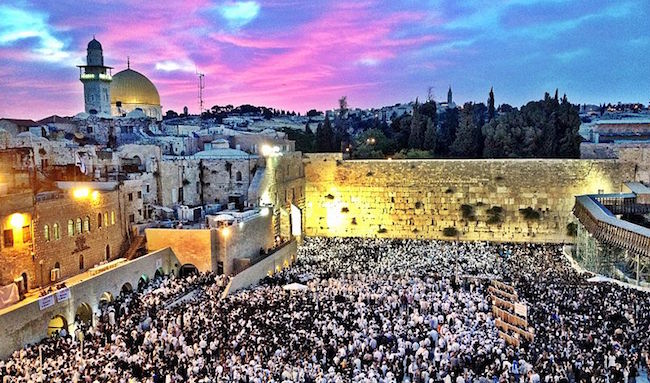A very central tenent of Judaism is to remember. God commands us to remember in the Torah and the Jewish people have done their best to remember important historical dates, whether good or bad. This is true regarding “The Three Weeks.”
“The Three Weeks” have become a time of intense mourning for the Jewish people as we remember the tragedies of the past. Historically, The 9th day of the Hebrew month Tammuz is the date that Nebuchadnezzar and the Babylonian army breached the walls of Jerusalem after a long siege (2 Kings 25:3-4). This breach eventually led to the destruction of the First Temple on the 9th day of the Jewish month Av. Scripture records that Nebuzaradan, the captain of the guard of the Chaldeans, entered the city of Jerusalem to destroy the Temple on either the 7th or 10th of Av (2 Kings 25:8-9. Jer. 52:12). Nebuzaradan more then likely entered Jerusalem on the 7th of Av and completed the destruction of the Temple on the 10th of Av. This being said, traditional Judaism holds that it was on the 9th of Av that the Temple was destroyed.
The Destruction of the Temple
The 17th of Tammuz (which falls on July 11, 2017) marks the date when the Romans breached the walls of Jerusalem and eventually led to the Second Temple being destroyed, which was also on on the 9th day of Av (which falls on August 1, 2017). It is these two later dates on the Jewish calendar, the 17th of Tammuz and the 9th of Av, which now provide for us a timeframe of three weeks (July 11 – August 1, 2017) to mourn the destruction of the Temple, the center of worship for the Jewish people.
There are also many other historical and traditional tragedies that occurred during these three weeks. For example, it is believed in Jewish tradition that on the 17th of Tammuz Moses broke the tablets of the Ten Commandments after seeing the Golden Calf and the sin of the people. In remembrance of this tragic event there is mourning over the sin and lack of faith of the Jewish people.
Jewish Customs During the Three Weeks
During these three weeks of mourning there is a gradual heightening of the mourning, which culminates on the 9th of Av. To begin and end these three weeks there is a corresponding fast day. On the 17th of Tammuz a fast day is observed from dawn until nightfall. This fast includes refraining from both eating and drinking. In the middle of the three weeks, on the first day of the month of Av, there is a heightened sense of mourning: there is no eating of meat or drinking of wine during these nine days.
On the week preceding the 9th of Av there is no unnecessary bathing (bathing for pleasure) or buying of new clothing or furniture; all things which bring joy to the family and the home. Then on the 9th of Av a more intense fast day is observed. The fast of the 9th of Av begins on the evening before at nightfall and continues until the following evening. The book of Lamentations is read in the synagogue on the evening of the 9th of Av.
There are certain things that religious Jews will refrain from doing during these three weeks as a sign of mourning and to remember the pain of the past. Here is a list of some of the prohibitions during this time:
- No shaving or cutting of the nails.
- No attending of entertainment.
- Ashkenazi Jews will not have a wedding during this time period.
By lessening the joy and privileges that we daily take for granted, we remember the destruction and the pain of the past.
The Hope of Israel
One of the Scriptures read during the daily prayers on the 17th of Tammuz is from the prophet Isaiah. The whole chapter is filled with hope which is found in seeking the LORD alone. We see this hope in these couple of verse from Isaiah 55:
Seek the LORD while He may be found;
Call upon Him while He is near.
Let the wicked forsake his way
And the unrighteous man his thoughts;
And let him return to the LORD,
And He will have compassion on him,
And to our God,
For He will abundantly pardon. – Isaiah 55:6-7
Throughout the days of mourning there is always the hope of a better future as prophesied by the prophet Jeremiah:
Then the virgin will rejoice in the dance,
And the young men and the old, together,
For I will turn their mourning into joy
And will comfort them and give them joy for their sorrow. – Jer. 31:13
The Jewish people have twice lost their right to stay in the Land and worship at the Temple, the place where God chose to place His Name. The loss has been great and the exile has been painful, however, a greater loss has also occurred in Jewish history. The Messiah came to this earth and wanted to bring real and eternal joy to all of Israel and to all of the world. The Jewish people as a whole were not ready at that time and many rejected Yeshua as the Messiah. Towards the end of His ministry years Yeshua spoke these words:
Jerusalem, Jerusalem, who kills the prophets and stones those who are sent to her! How often I wanted to gather your children together, the way a hen gathers her chicks under her wings, and you were unwilling. Behold, your house is being left to you desolate! For I say to you, from now on you will not see Me until you say, ‘Blessed is He who comes in the name of the Lord! – Matthew 23:37-39
According to Jewish tradition, regarding these Three Weeks, there is great hope and expectation that those who mourn for the destruction of Jerusalem will one day see the coming of the Messiah. Let us pray that many Jewish people will say “Blessed is He who comes in the name of the Lord!” and come to know their Messiah during this time of deep reflection.
The Three Weeks begin on July 11, 2017 and end on the evening of August 1, 2017.
If you enjoyed reading this article, share it today with friends! We also invite you to sign up for our weekly Torah Portion commentary on the sidebar to the right.
Help keep our weekly commentaries free and available to all. Click here to donate today:
Return to Torah Portion Homepage
Copyright Jewels of Judaism. All rights reserved 2017




Historically, both of 1st Temple and 2nd Temple were destroyed by the Babylons in 586 B.C.E. and the Romans in 70 C.E. Spanish Jews were expelled from Spain in 1492 C.E when Christopher Colombus, the famous Italian Jewish explorer who was befriended by one of my ancestors in my D’Auria Family Tree–Franceso Doria, the important banker in Serville, Spain as Christopher Colombus finally discovered the new land in the New World–America on October, 14th, 1492 C.E. Still, the Jewish Disporia surieves in Europe. During the World War II, Nazi German Chancellor Hilter had destroyed some of my D’Auria Family in Italy, Berlus, Germany and other European countries. After, May, 14th, 1948, one of my other ancestors finally made alyiah to Israel. In my D’Auria Family Tree, there are several Jewish members including me in our America and in the World today. Christa D’Auria